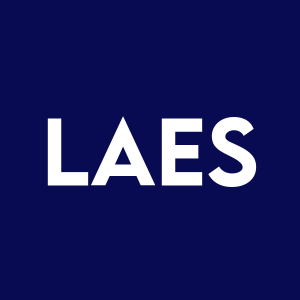SEALSQ to Enhance Traditional PKI Offering with Post-Quantum Cryptography and Post-Quantum Semiconductors, Ensuring Future-Proof Security
Rhea-AI Summary
SEALSQ Corp (NASDAQ: LAES) announces plans to enhance its traditional Public Key Infrastructure (PKI) technology with Post-Quantum Cryptography (PQC) and post-quantum semiconductors. This move aims to safeguard sensitive data from emerging quantum threats. SEALSQ is adopting NIST-standardized post-quantum algorithms like Crystals-Kyber, Crystals-Dilithium, Sphincs+, and Falcon, which can operate on classical hardware while resisting quantum attacks.
As part of the WISeKey Group, SEALSQ has managed a PKI Root of Trust since 1999, delivering over 6 billion secure downloads. By integrating PQC and innovative semiconductor technology, SEALSQ is pioneering a comprehensive approach to protect digital infrastructures against future quantum computing threats while maintaining high levels of trust and reliability.
Positive
- Adoption of NIST-standardized post-quantum cryptography algorithms
- Integration of post-quantum semiconductors into existing solutions
- Enhancing PKI offerings to ensure resilience against quantum computing threats
- Leveraging WISeKey Group's established PKI Root of Trust with 6 billion secure downloads
Negative
- None.
News Market Reaction 1 Alert
On the day this news was published, LAES declined 5.04%, reflecting a notable negative market reaction.
Data tracked by StockTitan Argus on the day of publication.
Geneva, Switzerland, Sept. 17, 2024 (GLOBE NEWSWIRE) --  SEALSQ Corp (NASDAQ: LAES) ("SEALSQ" or "Company"), a company that focuses on developing and selling Semiconductors, PKI and Post-Quantum technology hardware and software products, today announces its intention to complete traditional existing Public Key Infrastructure (PKI) technology with advanced Post-Quantum Cryptography (PQC) and post-quantum semiconductors. This development reflects SEALSQ's commitment to staying ahead of the rapidly evolving cybersecurity landscape and safeguarding sensitive data from emerging quantum threats.
SEALSQ Corp (NASDAQ: LAES) ("SEALSQ" or "Company"), a company that focuses on developing and selling Semiconductors, PKI and Post-Quantum technology hardware and software products, today announces its intention to complete traditional existing Public Key Infrastructure (PKI) technology with advanced Post-Quantum Cryptography (PQC) and post-quantum semiconductors. This development reflects SEALSQ's commitment to staying ahead of the rapidly evolving cybersecurity landscape and safeguarding sensitive data from emerging quantum threats.
For over two decades, traditional cryptographic standards such as RSA and ECC (Elliptic Curve Cryptography) have formed the foundation of internet security, protecting billions of online interactions and transactions. However, with the rise of quantum computing, these standards face significant vulnerabilities. As quantum technology progresses, it is becoming increasingly likely that powerful quantum computers could break RSA and ECC encryption, rendering existing security methods inadequate.
To address these challenges, SEALSQ is adopting post-quantum cryptography algorithms like Crystals-Kyber, Crystals-Dilithium, Sphincs+, and Falcon. These cutting-edge algorithms, designed to withstand the computational power of quantum computers, can also operate seamlessly on classical computer hardware, ensuring compatibility with current devices and systems. Importantly, these algorithms do not require a quantum computer to function, making the transition more practical and efficient.
In 2022, the National Institute of Standards and Technology (NIST) took a significant step toward securing the future of cryptography by announcing the standardization of these post-quantum algorithms. SEALSQ’s adoption of these standards demonstrates its proactive approach to implementing robust, future-proof security solutions.
In addition to cryptography, SEALSQ is integrating post-quantum semiconductors into its solutions, further enhancing the resilience of connected devices and systems in the post-quantum era. These semiconductors, designed with quantum-resistant architectures, provide enhanced performance, power efficiency, and security in anticipation of quantum computing breakthroughs. By combining post-quantum cryptographic algorithms with innovative semiconductor technology, SEALSQ is pioneering a comprehensive approach to safeguarding digital infrastructures from quantum threats.
As part of the WISeKey Group, SEALSQ has been operating a PKI Root of Trust since 1999, managing a robust infrastructure that has delivered over 6 billion secure downloads to date. By transitioning to post-quantum cryptography and semiconductors, SEALSQ continues to enhance its PKI offerings, ensuring resilience against tomorrow’s quantum computing threats while maintaining the highest levels of trust and reliability.
Introduction to Post-Quantum Cryptography
Understanding the Need for Quantum-Resistant Cryptography
As we venture further into the digital age, the security of our information systems becomes increasingly paramount. Classical cryptographic techniques, which have long safeguarded our data, are now under threat from the advent of quantum computing. Quantum computers leverage the principles of quantum mechanics to perform computations that are infeasible for classical computers. This immense processing power poses a significant risk to traditional cryptographic algorithms, such as RSA and ECC, which form the backbone of our current security infrastructure.
Quantum computers have the potential to solve complex mathematical problems exponentially faster than classical computers. For example, Shor's algorithm, a quantum algorithm, can efficiently factor large integers, undermining the security of RSA encryption. Similarly, elliptic curve cryptography (ECC) can be compromised by quantum computers using advanced algorithms. This looming threat has sparked a global effort to develop cryptographic methods that are resistant to quantum attacks—hence, the need for quantum-resistant cryptography.
The Implications of Quantum Computing on Current Cryptographic Standards
The implications of quantum computing for current cryptographic standards are profound. Cryptographic algorithms that have been considered secure for decades could become obsolete almost overnight, exposing sensitive data to potential breaches. The transition to quantum-resistant cryptography is not merely a matter of enhancing existing algorithms; it requires fundamentally new approaches to ensure data remains secure against quantum-enabled adversaries.
Post-quantum cryptography (PQC) involves the development of cryptographic algorithms that can withstand the power of quantum computing. The National Institute of Standards and Technology (NIST) has been at the forefront of this initiative, evaluating and standardising PQC algorithms to replace or augment existing standards. Among the leading candidates are lattice-based algorithms such as Kyber (a key encapsulation mechanism) and Dilithium (a digital signature algorithm), both of which offer robust security against quantum attacks while maintaining efficiency and performance.
The shift to PQC is crucial for safeguarding not only future data but also information that is currently encrypted and may be susceptible to "harvest now, decrypt later" attacks. In these scenarios, adversaries collect encrypted data now, with the intention of decrypting it once quantum computers become available. By transitioning to quantum-resistant algorithms, we can ensure the long-term confidentiality and integrity of our digital communications and data storage.
In conclusion, the emergence of quantum computing necessitates a proactive approach to cryptographic security. Understanding the need for quantum-resistant cryptography and the implications for current standards is the first step in preparing for a post-quantum world. SealSQ is committed to leading this transition with advanced solutions like the QS7001 platform, designed to provide robust security for IoT devices in an era where quantum threats are no longer theoretical but imminent.
SealSQ's Commitment to Post-Quantum Security
SealSQ is leading the charge in securing our digital future against quantum threats. With a focus on innovation, SealSQ has developed the QS7001 platform, a state-of-the-art microcontroller designed to provide quantum-resistant security for IoT devices. This platform incorporates advanced NIST-recommended algorithms, Kyber and Dilithium, ensuring robust protection against quantum attacks.
SealSQ’s commitment to innovation and security is reflected in its rigorous adherence to industry standards and certifications. Their new QS7001 platform is certified to Common Criteria EAL5+ and compliant with FIPS SP800-90B, demonstrating its reliability and robustness in providing advanced security solutions. By pioneering these technologies, SealSQ is not only enhancing IoT security but also paving the way for a secure digital future amidst the challenges posed by quantum computing. We explore how this game-changing platform will be a vital tool in securing the world's IoT devices for the future Post-Quantum world.
Key Features of the QS7001 Platform

Quantum-Resistant Cryptography Algorithms
The QS7001 platform is equipped with advanced quantum-resistant algorithms, Kyber and Dilithium, which are recommended by NIST. These algorithms provide strong security against potential quantum computing attacks, ensuring that IoT devices remain secure in the post-quantum era.
High-Performance Secure RISC-V Architecture
At the core of the QS7001 is a high-performance, low-power 32-bit RISC-V architecture. This secure microcontroller delivers robust computational power while maintaining energy efficiency, making it ideal for a wide range of IoT applications. The RISC-V architecture is known for its flexibility and scalability, allowing for seamless integration into various devices and systems.
Advanced Cryptographic Accelerators
The QS7001 features a suite of cryptographic accelerators designed to enhance the performance of security operations. These include accelerators for AES (128/192/256), RSA (up to 4096 bits), ECC (256/384 bits), and SHA2/3 (256/384 bits). These accelerators enable fast and efficient encryption, decryption, and authentication processes, providing robust security without compromising performance.
Comprehensive Security Measures
The QS7001 platform incorporates multiple layers of security to protect against various attack vectors. These include:
- Physical Attack Resistance: Dedicated hardware protection against side-channel attacks, such as SPA, DPA, SEMA, and DEMA.
- Environmental Protection: Monitors for voltage, frequency, temperature, and light to safeguard against environmental manipulation.
- Secure Memory Management: Features such as secure memory access and supervisor mode ensure that sensitive data is protected at all times.
- Flexible Communication Interfaces
- The QS7001 supports various communication protocols, including I2C and SPI, with auto-detection capabilities. It features a high-speed SPI controller that operates up to 33Mbps and a robust I2C interface with speeds up to 1Mbps. These interfaces ensure seamless connectivity and interoperability with other devices in an IoT ecosystem.
Robust Memory and Storage Capabilities
With 512K bytes of flash memory, 80K bytes of RAM, and 128K bytes of ROM, the QS7001 provides ample storage for firmware, applications, and cryptographic operations. The flash memory supports up to 500k write/erase cycles with wear leveling, ensuring long-term data retention and reliability.
By integrating these key features, the QS7001 platform stands out as a powerful and versatile solution for enhancing the security of IoT devices, ready to face the challenges posed by quantum computing advancements.
Certification and Compliance

Common Criteria EAL5+ Certification
The QS7001 platform has achieved Common Criteria EAL5+ certification, a prestigious recognition in the realm of security standards. This certification indicates that the platform has undergone rigorous evaluation and testing to ensure it meets the highest security requirements. The EAL5+ level is particularly significant for devices requiring a high degree of assurance, such as those used in sensitive IoT applications.
FIPS SP800-90B Compliance
In addition to its EAL5+ certification, the QS7001 platform is compliant with FIPS SP800-90B standards. This compliance ensures that the random number generation and cryptographic mechanisms within the platform adhere to the stringent requirements set forth by the Federal Information Processing Standards (FIPS). This standard is critical for maintaining the integrity and security of cryptographic functions, particularly in environments where data security is paramount.
Meeting Industry Standards
By adhering to these certifications, the QS7001 demonstrates SealSQ's commitment to providing secure, reliable solutions for the IoT industry. These certifications not only validate the robustness of the QS7001’s security features but also assure customers that the platform is equipped to handle the most demanding security challenges.
Ensuring Long-Term Security and Trust
Achieving these certifications underscores the long-term reliability and security of the QS7001 platform. As the landscape of cybersecurity continues to evolve, having a certified and compliant platform ensures that IoT devices can maintain high-security standards and protect sensitive data against emerging threats.
In summary, the QS7001's certification and compliance with industry-leading standards like Common Criteria EAL5+ and FIPS SP800-90B reinforce its position as a top-tier solution for post-quantum IoT security, offering unparalleled assurance and peace of mind to users and developers alike.
Practical Applications of the QS7001

Smart Cities
In the realm of smart cities, the QS7001 platform plays a crucial role in securing various interconnected systems. From smart grids to traffic management and public safety systems, the QS7001 ensures that data transmitted and stored across city infrastructure is protected against quantum and classical attacks. Its robust cryptographic capabilities and secure communication interfaces make it an ideal solution for managing the vast amount of data and numerous connections inherent in smart city environments.
Healthcare
The healthcare industry relies heavily on the secure transmission and storage of sensitive patient data. The QS7001 provides the necessary security measures to protect electronic health records (EHRs), medical devices, and telemedicine platforms from cyber threats. Its quantum-resistant cryptographic algorithms safeguard patient information against future quantum computing threats, ensuring long-term data confidentiality and integrity.
Automotive
In the automotive sector, the QS7001 platform enhances the security of connected vehicles and their communication systems. As vehicles become increasingly autonomous and connected, the need for secure communication between vehicle-to-vehicle (V2V) and vehicle-to-infrastructure (V2I) systems becomes paramount. The QS7001’s advanced cryptographic accelerators and secure memory management provide robust protection for these critical systems, preventing unauthorised access and ensuring the safe operation of connected vehicles.
Industrial IoT (IIoT)
Industrial IoT applications, such as smart manufacturing and supply chain management, benefit significantly from the QS7001’s security features. The platform’s ability to secure data exchange between machines, sensors, and control systems ensures the integrity and confidentiality of operational data. Its resistance to physical and side-channel attacks makes it suitable for deployment in harsh industrial environments, where security and reliability are critical.
Financial Services
In the financial sector, the QS7001 can be used to secure transactions, protect customer data, and ensure the integrity of financial systems. Its compliance with high-security standards and support for quantum-resistant algorithms make it an ideal choice for securing online banking, mobile payments, and blockchain applications. The platform's robust security features help prevent fraud and cyber attacks, ensuring trust and confidence in digital financial services.
Consumer IoT
For consumer IoT devices, such as smart home appliances, wearables, and personal gadgets, the QS7001 offers unparalleled security to protect user data and privacy. Its flexible communication interfaces and low-power consumption make it suitable for a wide range of consumer electronics, ensuring that these devices can securely interact with each other and with cloud services. By implementing QS7001, manufacturers can enhance the security and trustworthiness of their products, providing peace of mind to consumers.
Government and Defence
Government and defence applications require the highest levels of security to protect sensitive information and communication systems. The QS7001’s advanced cryptographic capabilities and compliance with stringent security standards make it an excellent choice for securing government networks, defence communications, and critical infrastructure. Its robust protection against quantum and classical attacks ensures that classified information remains secure, even in the face of emerging quantum threats.
By integrating the QS7001 platform into these various applications, SealSQ is helping to secure the future of IoT in a post-quantum world. Its versatile and powerful features make it a vital component for any system requiring strong, long-term security measures.
Benefits of Implementing QS7001 in IoT Devices

Enhanced Security Against Quantum Attacks
One of the most significant benefits of adopting the QS7001 is its robust defense against quantum attacks. By integrating NIST-recommended quantum-resistant algorithms such as Kyber and Dilithium, the QS7001 ensures that your IoT devices are future-proofed against the computational power of quantum computers. This foresight protects sensitive data and maintains system integrity, providing long-term security assurance.
Scalability and Flexibility
The QS7001’s high-performance RISC-V architecture offers excellent scalability and flexibility, making it suitable for a wide range of applications. Whether you're deploying in a small-scale consumer device or a large-scale industrial system, the QS7001 can be tailored to meet specific requirements. Its flexible communication interfaces (I2C, SPI) and extensive peripheral support enable seamless integration into various devices, simplifying the engineering process and reducing time to market.
Low Power Consumption
In the world of IoT, power efficiency is crucial. The QS7001 is designed with low-power operation in mind, featuring idle and power-down modes that help conserve energy. This low power consumption is particularly beneficial for battery-operated devices, extending their operational life and reducing maintenance costs. Engineers can leverage this efficiency to develop sustainable, long-lasting products.
Advanced Cryptographic Performance
The QS7001 is equipped with powerful cryptographic accelerators for AES, RSA, ECC, and SHA algorithms, ensuring fast and efficient encryption and decryption processes. This advanced cryptographic performance not only enhances security but also boosts overall system performance. Businesses benefit from reduced latency and improved user experience, which can be critical for time-sensitive applications.
Cost-Effective Solution
Implementing the QS7001 can lead to significant cost savings over time. Its durable design, capable of withstanding up to 500k write/erase cycles with wear leveling, ensures longevity and reduces the need for frequent replacements. Additionally, its comprehensive security features minimise the potential costs associated with data breaches and cyber attacks, such as financial losses, legal repercussions, and damage to brand reputation.
Market Differentiation
Adopting the QS7001 allows businesses to differentiate their products in a competitive market by emphasising superior security features. This differentiation can be a key selling point, particularly in industries where security is a critical concern. Offering a product with quantum-resistant capabilities positions a company as an industry leader, attracting customers who prioritise long-term security.
Future-Proofing Investments
By investing in the QS7001, businesses can future-proof their IoT devices against evolving security threats. As quantum computing advances, having a platform that is already equipped to handle these new challenges ensures that products remain viable and secure for years to come. This strategic foresight protects investment and reduces the need for costly upgrades or replacements in the future.
In conclusion, the QS7001 provides a multitude of practical benefits, from enhanced security and low power consumption to regulatory compliance and market differentiation. Its adoption not only strengthens the security posture of IoT devices but also offers significant engineering and business advantages, making it a valuable asset for any organisation looking to secure its future in a post-quantum world.
SealSQ is at the forefront of securing the future of IoT in a rapidly evolving digital landscape. With the QS7001 platform, you can ensure your devices are protected against the emerging threats posed by quantum computing while benefiting from advanced cryptographic performance and comprehensive security features.
About SEALSQ
SEALSQ focuses on selling integrated solutions based on Semiconductors, PKI and Provisioning services, while developing Post-Quantum technology hardware and software products. Our solutions can be used in a variety of applications, from Multi-Factor Authentication tokens, Smart Energy, Smart Home Appliances, Medical and Healthcare and IT Network Infrastructure, to Automotive, Industrial Automation and Control Systems.
Post-Quantum Cryptography (PQC) refers to cryptographic methods that are secure against an attack by a quantum computer. As quantum computers become more powerful, they may be able to break many of the cryptographic methods that are currently used to protect sensitive information, such as RSA and Elliptic Curve Cryptography (ECC). PQC aims to develop new cryptographic methods that are secure against quantum attacks. For more information, please visit www.sealsq.com.
Forward-Looking Statements
This communication expressly or implicitly contains certain forward-looking statements concerning SEALSQ Corp and its businesses. Forward-looking statements include statements regarding our business strategy, financial performance, results of operations, market data, events or developments that we expect or anticipates will occur in the future, as well as any other statements which are not historical facts. Although we believe that the expectations reflected in such forward-looking statements are reasonable, no assurance can be given that such expectations will prove to have been correct. These statements involve known and unknown risks and are based upon a number of assumptions and estimates which are inherently subject to significant uncertainties and contingencies, many of which are beyond our control. Actual results may differ materially from those expressed or implied by such forward-looking statements. Important factors that, in our view, could cause actual results to differ materially from those discussed in the forward-looking statements include the expected success of our technology strategy and solutions for IoMT Security for Medical and Healthcare sectors, SEALSQ's ability to implement its growth strategies, SEALSQ's ability to continue beneficial transactions with material parties, including a limited number of significant customers; market demand and semiconductor industry conditions; and the risks discussed in SEALSQ's filings with the SEC. Risks and uncertainties are further described in reports filed by SEALSQ with the SEC.
SEALSQ Corp is providing this communication as of this date and does not undertake to update any forward-looking statements contained herein as a result of new information, future events or otherwise.
Press and Investor Contacts
| SEALSQ Corp. Carlos Moreira Chairman & CEO Tel: +41 22 594 3000 info@sealsq.com | SEALSQ Investor Relations (US) The Equity Group Inc. Lena Cati Tel: +1 212 836-9611 / lcati@equityny.com Katie Murphy Tel: +212 836-9612 / kmurphy@equityny.com |







